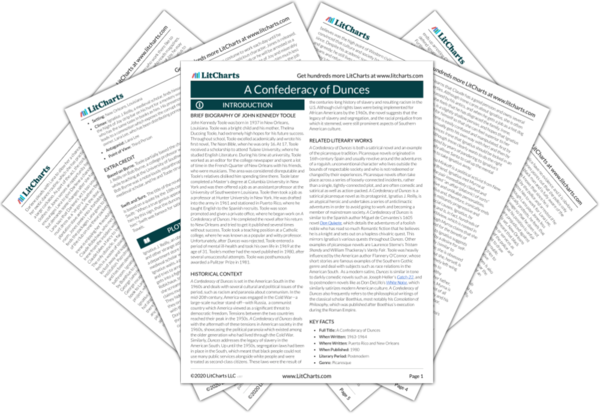The Consolation of Philosophy is a philosophical book written during the Roman Empire by Boethius, who was in prison and awaiting execution at the time. In the novel, The Consolation of Philosophy symbolizes Ignatius’s worldview which is more medieval than modern—Ignatius is a scholar of medieval history and thinks that the medieval period, although it seems bizarre to modern scholars, was far superior to the 20th century. The novel itself even mirrors the chapter structure of The Consolation of Philosophy, which, given that Ignatius is the protagonist, suggests that Consolation is foundational to his worldview and narrative.
The actual copy of The Consolation of Philosophy that Ignatius owns is representative of Ignatius’s quest for a meaningful life in an age in which he feels persecuted and like a stranger. This book is both a philosophical guide for Ignatius and becomes a literal guide when he follows a photograph of the book, which Lana Lee gets ahold of and poses behind in her homemade pornographic pictures, to the Night of Joy—a strip club which Lana owns. This symbolizes Ignatius’s quest to find companionship and to be understood in the modern age, as he thinks that the woman who poses behind the book must be a fellow intellectual. Ignatius also relates to the figure of Boethius, as Ignatius views himself as metaphorically imprisoned within modernity just as Boethius was literally imprisoned in his own time.
The Consolation of Philosophy Quotes in A Confederacy of Dunces
His vision of history temporarily fading, Ignatius sketched a noose at the bottom of the page. Then he drew a revolver and a little box on which he neatly printed gas chamber. He scratched the side of the pencil back and forth across the paper and labeled this APOCALYPSE.

Unlock explanations and citation info for this and every other A Confederacy of Dunces quote.
Plus so much more...
Get LitCharts A+Ignatius thought smugly that on their yellowed pages and wide-ruled lines were the seeds of a magnificent study in comparative history. Very disordered, of course. But one day he would assume the task of editing these fragments of his mentality into a jigsaw puzzle of a very grand design; the completed puzzle would show literate men the disaster course that history had been taking for the past four centuries.
As a medievalist Ignatius believed in the rota Fortunae, or wheel of fortune, a central concept in De Consolatione Philosophiae, the philosophical work which had laid the foundation for medieval thought. Boethius, the late Roman who had written the Consolatione while unjustly imprisoned by the emperor, had said that a blind goddess spins us on a wheel, that our luck comes in cycles. Was the ludicrous attempt to arrest him the beginning of a bad cycle? Was his wheel rapidly spinning downward? The accident was also a bad sign. Ignatius was worried. For all his philosophy, Boethius had still been tortured and killed.
“The ironic thing about that program,” Ignatius was saying over the stove, keeping one eye peeled so that he could seize the pot as soon as the milk began to boil, “is that it is supposed to be an exemplum to the youth of our nation. I would like very much to know what the Founding Fathers would say if they could see these children being debauched to further the cause of Clearasil. However, I always suspected that democracy would come to this.” He painstakingly poured the milk into his Shirley Temple mug. “A firm rule must be imposed upon our nation before it destroys itself.”
“Ignatius, what’s all this trash on the floor?”
“That is my worldview that you see. It still must be incorporated into a whole, so be careful where you step.”
“I refuse to look up. Optimism nauseates me. It is perverse. Since man’s fall, his proper position in the universe has been one of misery.”
If Levy Pants was to succeed, the first step would be imposing a heavy hand upon its detractors. Levy Pants must become more militant and authoritarian in order to survive in the jungle of modem commercialism.
She described to Ignatius the courage of Patrolman Mancuso, who, against heavy odds, was fighting to retain his job, who wanted to work, who was making the best of his torture and exile in the bathroom at the bus station. Patrolman Mancuso’s situation reminded Ignatius of the situation of Boethius when he was imprisoned by the emperor before being killed.
Some musk which my system generates must be especially appealing to the authorities of the government. Who else would be accosted by a policeman while innocently awaiting his mother before a department store? Who else would be spied upon and reported for picking a helpless stray of a kitten from a gutter? Like a bitch in heat, I seem to attract a coterie of policemen and sanitation officials. The world will someday get me on some ludicrous pretext; I simply await the day that they drag me to some air-conditioned dungeon and leave me there beneath the fluorescent lights and soundproofed ceiling to pay the price for scorning all that they hold dear within their little latex hearts.












